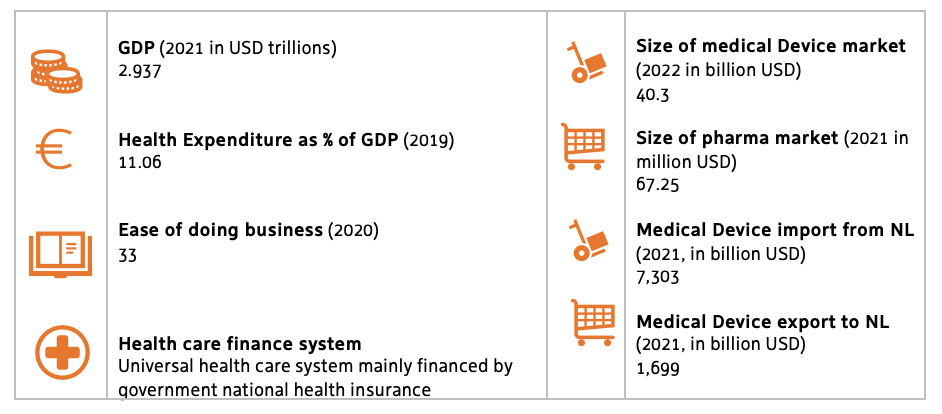France is the seventh largest economy worldwide, and the second largest economy in Europe. The health outcomes in France are ranked among the best in the European Union, with spending on healthcare being around 11.5% of GDP, higher than the EU average. French organisations are more and more open to collaboration in research and development projects, however, these tend to be oriented towards Germany, UK, Italy and the United States. A strong network of health innovation clusters (les pôles de compétitivité en santé) are present in the different regions of France. Their main aims are to: stimulate innovation, support the development of SMEs, grow internationally, and to offer high level infrastructures.
In June 2021, Macron announced the Health Innovation Plan with a budget of €7.5 billion. It is part of the comprehensive 'France 2030' plan to revitalise the French economy, with a total budget of €54 billion over almost a decade. The plan aims to "transform key sectors of the economy". In January 2022, Bruno Bonnell took charge of this plan and was appointed secretary-general for investment. The French president expressed the ambition for France to regain its position as a leader in healthcare innovation in Europe, focusing on biotherapies, digital healthcare, emerging infectious diseases and medical technologies.

Digitisation: The French government is implementing reforms to promote the development of digital health care, including more opportunities to use health data and the use of a digital health space for each patient. Digitalisation is also a tool to focus more on prevention instead of curative care and give people greater control of their health.
Decentralisation: Access to local health care must be improved, including the creation of the regional professional health organisations (Communautés Professionenelles Territoriales de Santé). Existing CPT solutions include multidisciplinary care centers (Maisons de santé pluridisciplinaires). Addressing "les deserts medicaux" is also a priority of the new French cabinet. The Ma Sante 2022 strategy reinforces the approach to tackles these ‘deserts’ and gives, among others, new innovative tools in the field of e-health, an important tool to increase access to health care.
Greater patient control: The active role that patients play in their own treatment must be improved. The goal is to provide everyone with the means to find, assess and use available expertise. In order to make informed decisions about their own health, where there is a special role for mental health and healthy ageing, two topics considered priorities in France.
From the perspective of the Netherlands the following market trends are of interest:
Trade
1. The Digital Transformation of Health and Care
- Telehealth
- Online patient and healthcare processes management (EHR, Mobile Healthcare Apps)
- Artificial Intelligence in health
2. Accessible Medical Technology for Sustainable Health and Care
- Wearables and medical devices
- Homecare – medical ‘home-use’ disposables
- Imaging and radiotherapy
3. Biopharma
- Noncommunicable diseases, specifically diabetes, cardiovascular disease.
- Geriatric diseases (Alzheimer)
4. Infrastructure
- Hospital renovation and modernisation
Research and Innovation
- Development of key enabling technologies (especially AI) and MedTech applied in health & care.
- Data infrastructure and interoperability, including development of digital tools.
- R&D in the field of chronic & rare/niche diseases, specifically in the field of oncology, Alzheimer, diabetes and endometriosis, including in EU-context (e.g. Horizon Europe and French IPCEI proposal on Health). R&D in the field of vaccines.
- R&D and innovative solutions in the field of healthy ageing.
- Innovation in environmental health.
- Innovative solutions in the field of prevention, including link with agrifood (e.g. Nutriscore).
- One-Health: further development of (EU) policy and R&D&I on anti-microbial resistance (AMR) and the prevention of future pandemics.
- Strengthening strategic value chains, e.g. in the field of personal protective equipment and medicines (together with trade and possibly NFIA).
R&D Collaborations
We see a significant amount of international R&D cooperation projects between the Netherlands and France with applications in the health and care market. EUROSTARS is an important instrument for SME R&D collaborations with French partners. This programme makes it possible to apply for funding for bilateral or multilateral research and innovation projects. The 4th call of the Eurostars-3 programme is expected to open in January 2023 and close in March 2023. As soon as the exact opening and closing dates are known, you will read about it on the Netherlands Enterprise Agency’s website (RVO.nl). France has also started together with several European countries including the Netherlands, an IPCEI (Important Project for Common European Interest) on Health, proposing investments in R&D&I in several areas (e.g. AMR, API’s and cell therapy).
Netherlands Enterprise Agency could be a valuable entrance point for companies and consortia with research and innovation ambitions with French partners. Because of it’s role as member of EUREKA network and national contact point for Horizon Europe and EU4Health, Netherlands Enterprise Agency has warm relations with Bpifrance and diverse institute NCPs .
Invest
When looking at the FDI trends France houses an interesting LSH cluster with potential to attract investment to the Netherlands. Several leading French companies are present in the Netherlands already. As part of the French the aforementioned “France 2030” strategy, nearly €7 billion will be made available to promote innovative investments in healthcare.
An overview of strong sectors in France that are interesting to explore for investment are:
- Healthtech: A dynamic sector comprising 1,700 companies with nearly €1.8 billion in funds raised
- Medical devices: France has many innovative startups and is Europe’s second leading market for medical devices.
- Connected healthcare: The French government is acutely aware of the importance of digital technology in the healthcare sector and so has placed it at the
- Medicinal products and vaccines: France is the world’s fifth largest market for medicinal products for human use and the fourth largest exporter of vaccines.
- Cancer treatment: France is a leader in cancer research; the Institut Gustave Roussy is Europe’s leading institute in the fight against cancer.
- Chronic diseases: France is renowned for its expertise and research excellence in the fight against chronic diseases such as diabetes, hepatitis and cardiovascular disease.
In France the Netherlands Foreign Investment Agency (NFIA / Invest in Holland network) has one location in Paris. This office serves as the first point of contact to support and promote investment opportunities for French companies looking to connect with the LSH eco-system in the Netherlands. This work is supported by the Invest in Holland LSH team.
The Invest in Holland LSH team will focus on supporting French companies that will contribute to the goal of the Netherlands in finding solutions that deliver better, affordable and sustainable healthcare and strengthen our Life Sciences & health ecosystems.
Regional priorities/French LSH Clusters
The 'Pôle de compétivité' are regional and inter-regional clusters promoting the development of collaborative projects in research and development that are particularly innovative. They are active in most activity sectors, and seven of these Pôles are focussed on LSH:
- Alsace Biovalley.. Located in the Alsace region, accompanying, federating and animating the health sector of the Grand Est this cluster is dedicated to therapeutic innovations, both in drug development and Medtech.
- Atlanpole Biotherapies. Based in the Pays de la Loire – Brittany – Center Val de Loire regions, this cluster focuses on biotherapy and co-ordinates the work of laboratories, companies and platforms for a public-private complete, relevant and competitive solution, on the bio-medicine value chain from target discovery to clinical evaluation.
- Cancer-Bio-Santé. This bi-regional cluster (Midi-Pyrénées and Limousin) is dedicated to oncology and ageing.
- Eurobiomed. Located in the Occitanie est and Provence-Alpes Côte d’Azur regions, Eurobiomed focuses on translational and clinical research, technological innovation and health sector startups. It is a fusion of two former clusters: Eurobiomed (Montpellier) et Cancer Bio Santé (Toulouse) to create a health cluster of European level.
- Lyonbiopôle. This cluster, located in Lyon, aims to support the following strategic areas: human medicine, veterinary medicine, in vitro diagnostics, medical devices and medical technologies.
- Medicen Paris Region. This cluster, situated in Paris, focuses on five strategic areas: biological diagnostics, diagnostic and interventional imaging, regenerative medicine and biomaterials, digital health and translational medicine.
- Nutrition-Santé-Longevity. NSL, located in Lille (Hauts-de-France), is the only cluster at the interface of nutrition and health at a national level, bringing together players from the agro-nutrition, biotech- pharma, medtech-hospitech, e-health, and healthy ageing sectors.
- EURASANTé. Lille Northern France Health Cluster, Eurasanté is a development agency dedicated to tech transfer and business development in life sciences sector.
- MEDICALPS: MEDICALPS is the health technology cluster of the alps, based in Grenoble. Their focus us on medtech, biotech and e-health.
Most prominent NL value chains (Innovate, Trade & Invest)
- The digital transformation of health and care.
This value chain contains among other things the innovation and business development opportunities of digital (tech) solutions, like AI for the transformation in the healthcare system. Also data infrastructure and data sharing models are areas for bilateral and EU collaborations.
Subtopics within this value chain: eHealth/Digital Health: products and services in the area of information and communication technology that contribute to the efficiency, effectiveness and digitalisation of the care sector (e.g. in the area of cost-effectiveness, interoperability and artificial intelligence).
Both France and the Netherlands have been investing in digitalisation of the healthcare sector due to rising costs, the increasing and changing demand and lack of healthcare professionals. In France, like in the Netherlands, stakeholders are convinced care will gradually shift to the patients’ environment (rural areas, neighbourhood and even their house), digital transformation is believed to put the patient in the center and bring the care to the patient in a cost-efficient way. France reserved 2 billion Euros to invest in the digitalisation of their healthcare system as part of their healthcare strategy 2020-2030. Moreover, the French President recently inaugurated the PariSanté Campus, a dedicated site for digital health which will help strengthen the attractiveness and competitiveness of health innovation in France, with an investment of €400 million. One of the areas that shows great potential for cooperation between the France and Netherlands is interoperability of systems: the Netherlands has as a goal to fully digitalise all patient records in 2025. France shares a similar ambition. Discussions on bilateral and EU level are ongoing between both governments and have been accelerated by the pandemic (e.g. by the need for common Covid-19 QR-code). This is a strong base for further exchange and cooperation on the interoperability of systems and (research) data on bilateral and EU-level. Especially with the launch of the European Health Data Space (EHDS) in 2022.
a more structural cooperation with France on all levels (government, research and business).
- Accessible Medical Technology for Sustainable Health and Care
Medtech and Biotech are both big value chains in France. The sector represents more than 750 biotech companies and 1 100 Medtech companies. There is a strong growth in the number of e-health companies at the crossroads of biotechnology, medical devices and digital technology. One third of Frances partnerships are with foreign players and European research teams and companies are among the leading partners of French companies. The innovations of the Medtech and Biotech sector bring many benefits both for the patient and for the health system, by participating in the optimisation of health expenditure. Ranked No. 1 in the EU in KPMG’s Growth Promise Indicator, the Netherlands is brimming with Life Sciences business potential, both in biopharmaceutical and medical technology (MedTech). More than 300 public-private partnerships, such as Lygature, RegMed, and Oncode thrive in the Netherlands, facilitated by the Topsector organisation Health~Holland. Areas that show great potential for collaboration between the Netherlands and France are:
- Medical Imaging: France has a strong position in medical imaging, e.g. in the area of oncology and degenerative diseases and could be an area of cooperation. Medical imaging is also a priority for the Netherlands (with Philips as a driver for this development) and has built a strong international name in creating strong ecosystems of research, clinical and business organisations.
- Key-enabling technologies in Health: Both France and the Netherlands are strengthening their expertise in the area of AI and blockchain in healthcare and are setting up national AI- and Health Data Hubs. This momentum calls for bilateral (and European) cooperation on R&D&I.
- Infrastructure.
This value chain contains among other things the innovation and business development opportunities of hospitals and healthcare facilities of the future. As announced in the “Ségur de la santé”,the French Government committed a massive investment of 19 billion euros (6 billion of which from the France Recovery Plan) in the French healthcare system for a ten year period. These envelopes cover all fields – hospital, mental health, medico-social public or private - to give the flexibility to the players and to ensure that the response is adapted to the health needs of the territory. In short: 19 billion euros over ten years.
Overview Milestones & Collective Activities to France
2018
- Launch & publication of Market Report on France
- Seminar on market opportunities (Kansenseminar) in the French health sector
- French Delegation during the Health~Holland Visitors Programme
2019
- Economic Mission to the Paris Healthcare Week and Lyon with Bruno Bruins (MoU Medicen & TFHC)
- Seminar on AI (during visit Bruno Bruins)
- Start-up mission to the AI for Health Conference
- AI for Health Conference
- French Delegation during the Health~Holland Visitors Programme
2020
- Launch and publication Market study eHealth France
- Collective Holland Pavilion at SantExpo in Paris (cancelled due to COVID)
2021
- Virtual AI Mission with State Secretary Mona Keijzer (25-27 January) and the NL AI Coalition with Data & Health being of the four priority themes: blog.
- NLFR Innovation mission Data & Health: cooperation opportunities in de framework of Long COVID, (23-24 November, Paris) : blog.
- Online Business Day France (25 November) with a focus on the opportunities region Hauts-de-France and a webinar dedicated to LSH opportunities in Hauts-de-France.
- Dutch-French Health & Medtech exclusive network event (1 December, Paris) at the occasion of “Hello Tomorrow Deep Tech Days”
2022
- Mission to VivaTech with a Dutch start-up delegation
- MedFit Conference in Grenoble with focus on Medtech
- AI for Health summit Paris with a Dutch start-up delegation
- H~H Physical Meet-Up Europe
2023
- Trade Mission with focus on MedTech | Lille
The way forward
- To further integrate a joint approach (public, private and knowledge) in an LSH roadmap for France and further prioritize strategic value chains for NL-France cooperation
- To strengthen and deepen bilateral cooperation and concrete business opportunities with a focus on digitalization in healthcare; application of AI and other key enabling technologies in health & care and interoperability of data infrastructure and healthcare systems.
- To explore (new) activities and policy exchange on prevention (incl. of future pandemics), one health and strategic value chains (e.g. medicines, PBM, vaccines).
- To increase bilateral cooperation on R&D&I in the LSH sector, also in the context of European projects (like IPCEI).
Preferred actions for 2023
- The Topsector LSH, RVO and Embassy will look back and forward to create joint LSH multi annual strategy for France:
- Assemble and reassess the knowledge (studies) and trends of the past four years
- Prioritise the strategic value chains for further integrated bilateral investments and cooperation
- Map the relevant counterparts in France for policy, trade and innovation & research in the prioritised areas
- Verify the prioritised value chains with the Dutch sector stakeholders.
- Digitalisation in healthcare will remain focus and further investments in follow-up of activities in the area of AI application in healthcare and of the innovation mission on data & health in 2021 will be made, a.o.
- Facilitating study visits between NL and FR on data & health
- Supporting of joint research proposals on use cases (Long Covid) for interoperability of data
- Enabling further policy cooperation and discussion on EU data space
- Explore possibilities for a public private cluster on eHealth (via PIB/RVO)
- Exploring of new opportunities for cooperation in prioritised value chains, support Dutch stakeholders with interest in France and actively represent the Dutch sector in France:
- Invite FR target groups to annual Holland Visitors Program and World of Health Care congress
- Organise a mission/matchmaking as part of the multi-sectoral mission (DIO/RVO) or an Economic mission for this sector to Hauts-de-France
- Santexpo 2023
- Organise regular business coffee’s (zoom) for Dutch LSH entrepreneurs
- Partake in a start-up mission (e.g. Viva Tech) with LSH as sub-theme and support LSH start-ups in follow-up.
- Partake in the CES roadshow for LSH start-ups with interest in France
- Continue active communication on the NL in FR and RVO and HH website on interesting development and opportunities in France.
- Increasing bilateral cooperation on R&D&I in LSH by:
- Further support of bilateral/multilateral SME and PPP R&D cooperation (Mapping opportunities in HorizonEurope programme)
- Foster matches between NL-FR research fields (e.g. Oncology and Alzheimer)
- Foster matches between innovation clusters (after mapping) and further develop existing MoU’s.
- Supporting and participating in IPCEI Health proposal of France.


Digitalisation of the Life Sciences & Health Sector in France - Opportunities for FR-NL collaborations to improve health and healthcareTwo case studies: Île-de-France and Auvergne-Rhône-Alpes

